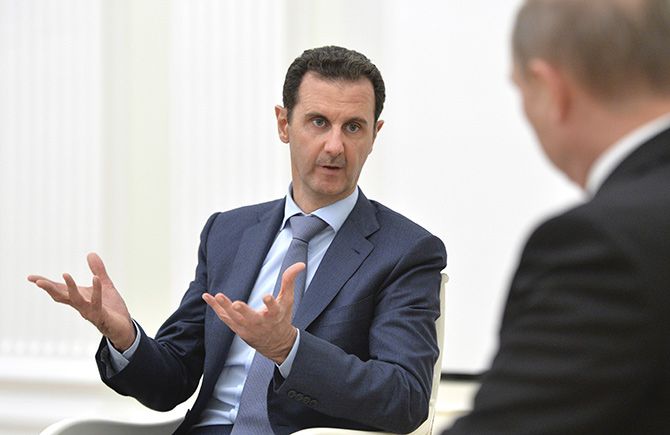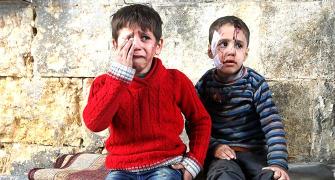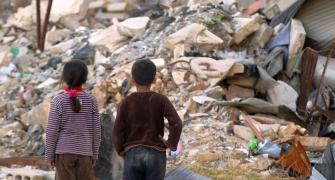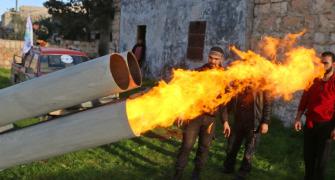'Surely, Syrian President Bashar al-Assad will not be able to pay or compensate the Russians for deployment and use of Russian men and equipment,' says Brigadier S K Chatterji (retd).

With the Russian defence budget registering a 7 per cent drop from the previous year's allocation, it's time to take stock of the potential of the often touted Russian resurgence and the possible threat it can pose to European Union countries.
The Russian budget for 2017 amounts to $48 billion. The EU, made up of 28 countries, of which 22 are a part of NATO, put together, spent a total of €203.143 billion on defence in 2015.
This is not an increase over previous years; however, it largely arrested the downward trend of about 4 to 5 per cent after the financial crisis of 2007.
The decrease in 2015 was a mere 0.4 per cent. 2016 witnessed greater vigour among EU states to ramp up military capabilities.
Overall, EU had an 8.3 per cent increase in defence budgets in 2016.
The Americans, who would in all likelihood, be embroiled in any major operations in the European continent, have a far larger budget.
Donald Trump's US defence budget proposes $824.1 billion for 2017; a 10 percent or a $54 billion increase as compared to 2016.
The increase sought, by itself, is more than what the Russians have earmarked as their entire defence budget for the year.
The Americans undertook a major build-up in Eastern Europe in January 2017 with 4,000 men and over a hundred tanks.
An analysis of Russian commitments throws more light on the issue of its capability at any further force projection in Europe or otherwise.
Russia maintains its military presence in 10 countries: Abkhazia, Armenia, Belarus, Vietnam, Kazakhstan, Kyrgyzstan, the unrecognised Transnistrian Republic, Syria, Tajikistan and South Ossetia.
Each deployment calls for allocation of funds. Sputniknews.com on October 8, 2016 quoted Russian Defence Minister Sergei Shoigu, stating that Russia intends enhancing its military bases abroad.
According to the minister, Russia is in discussions with Vietnam, Cuba, Venezuela, Nicaragua, the Seychelles and Singapore among others.
The Russian commitment in Syria is the most active deployment that it is funding. Various estimates of the cost of engagement in Syria are available. An IHS estimate of 2015 pegs the flow at $2.4 million per day.
Surely, Syrian President Bashar al-Assad will not be able to pay or compensate the Russians for deployment and use of Russian men and equipment.
The Russians also have to incur substantial expenditure to keep Crimea afloat. That would definitely not be reflected in the defence budget, but would perforce have to go out of the same exchequer's books.
Should the Russians pursue their plans of connecting Krasnodar Kray and Crimea with a 12 mile rail and motor bridge stretching over the Black Sea, it would, by some estimates, consume three-fourths of the Russian outlay for roads and rails.
Notwithstanding the huge difference in funding between a combined EU and that of Russia, the former considers Russia as its biggest threat.
With the outlays for defence being so widely different when a comparison is drawn between the overall defence spending and the US presence in Europe, is Russia really the great big threat that EU seems to have sleepless nights about?
With oil and gas prices unlikely to ride a steep curve in the near future, it may not be possible for the Russians to raise the level of threat either.
President Trump having expressed his aversion to footing the bill for European security, there is every likelihood of EU members increasing their defence spending.
NATO members are even otherwise agreed to spend 2 percent of their GDP for defence; but, as on date, many of its members fall far short.
If NATO members increase their budgets, it helps EU too.
EU's current threat perceptions, primarily Russia centric, further accentuated by terrorism, especially post the Syrian narrative; can push their defence budgets further north.
In the Russian case, Russian defence expenditure after long years of increased spending has gone south.
EU countries take the stance that post the 2007 financial downturn, when their budgets dipped; Russia continued to enhance its military expenditure and hence the Russian threat is more viable.
The argument has some well founded rational logic. As per SIPRI, Russia's military spending in 2015 was $66.4 billion, up 91 per cent compared with 2006 and 7.5 per cent in comparison to 2014.
The current apparent sensitivity to the Russians is not necessarily the true picture.
As far as a conventional threat is concerned, with a budget one-fifth of the EU, and commitments globally, it is hardly feasible for the Russians to stage another version of the German blitzkrieg.
The Russians may try to go beyond current positions in the Ukraine and try to nibble in the neighbourhood at best. That is as much as the Russians can afford.
Beyond it would be overreach, which actuated the break-up of the Soviet Union to Russia.
However, even such limited fallout creates great consternation in European capitals and needs to be guarded against with sufficient deterrence in place.
EU's common security and defence policy is the instrument for optimising defence expenditure of member States.
The problem areas lie in integrating capabilities of member States. Such a synthesis has proven to be quite a hurdle race.
EU countries have differing threat perceptions. Russia's proximate neighbours are more sensitive as compared to central/western/southern EU countries.
The Baltic States bordering Russia reflect the maximum increase. Latvia's budget will be up 60 per cent this year, Lithuania's by 35 per cent and Estonia will spend an additional 9 per cent.
Poland has implemented a substantial rise of 9 per cent in its defence expenditure. Romania has also enhanced its budget.
Putin may be ambitious, but is also a realist for sure.
With Russia trying to strengthen its influence in Central and South Asia, there is hardly any room for fresh manoeuvres in Europe.
The dilution creeping in the India–Russia relationship and the strengthening of the India-US relations has spurred the Russians to relate more strongly with China and work on linkages with Pakistan.
Russia is also assuming the role of a pre-eminent power broker in Afghanistan. However, its growing influence in South and Southeast Asia may not whet the Russian appetite, and they would like to be counted in Europe for certain.
If, by their logic, their neighbours get too proximate to the EU, or territories of such neighbouring States attract deployments that imperil them, the Russians could get the pot to boil and blow the bugle to caution the EU.
The EU has the second largest defence budget globally.
If EU countries can maintain their 18 battle groups in a high state of readiness and station them closer to Russian borders, the deterrence value could keep Russian moves in check.
As on date these battle groups have not been deployed on a mission, but are operational.
EU forces also have different logistics, command, control and communication systems.
The EU requires multinational battle groups capable of operating cohesively. They need to share costly resources and undertake long term acquisition planning to give their defence industry the best chance.
The Russian defence budget is fairly stretched by the current deployment of its force. The EU can meet the challenge by better coordinated defence rather than higher allocations for defence.
IMAGE: Syrian President Bashar al-Assad with Russian President Vladmir Putin at the Kremlin, October 20, 2015. Photograph: Alexei Druzhinin/RIA Novosti/Reuters









